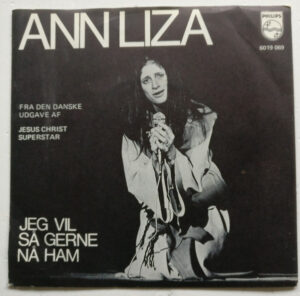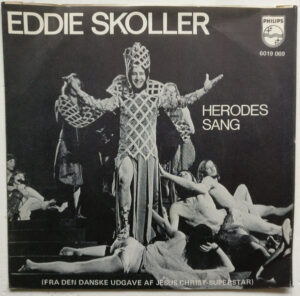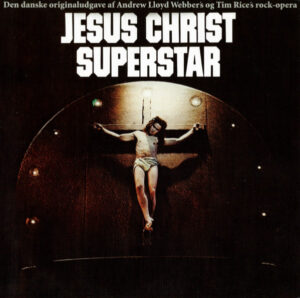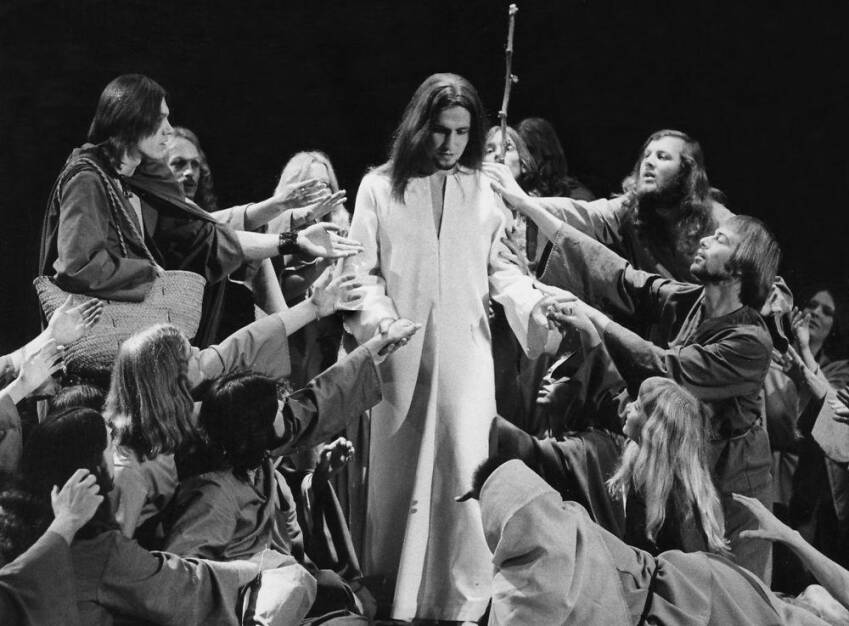Artwork
Recording Information
Classification: Original Danish Cast
Year of release: 1972
Language: Danish
Type: Stage cast
Explore
We have provided a complete recording of this now out-of-print album on our YouTube Channel. Unfortunately the video has been blocked by Universal Music A/S and is unavailable at this time.
Cast
Jesus of Nazareth…………Bruno Wintzell
Judas Iscariot…………Allan Mortensen
Mary Magdalene…………Ann Liza
Pontius Pilate…………Svend Johansen
King Herod…………Eddie Skoller
Simon Zealotes…………Dan Tillberg
Caiaphas…………Johnny Bjørgren
Annas…………Michael Fønss
Peter…………Sven Cleemann
Priests…………Peter Fibiger, Poul Olsen
Maid by the Fire…………Ina Løndahl
Soldier…………Claus Hagen Peterson
Old Man…………Eddie Jalving
The Chorus…………Elisabeth Barksted, Rebecca Brüel, Sanne Brüel, Jørn Budolfsen, Knud Christensen, Steen Christensen, Vibeke Eider, Gert Kenneth Hansen, Jannie Høeg, Hasse Jenbratt, Torben J. Jensen, Kirsten Johansen, Jan Dalhoff Jørgensen, Flemming Larsen, Lone Lau, Bente Merete, Hâkon Mohede, Gerd Egede Nissen, Lisa Renee, Geoffrey Silver, Inger Tønsberg
Orchestra
Guitar: Claus Asmussen, Lasse Lunderskov
Electric Bass: Gert Jensen
Piano: Torben Kjær
Drums: Alex Riel
Trumpets: Kaj Hill, Erik Larsen
Horns: Per Larsen, Per Olsen
Trombone: Axel Windfeld
Bassoon: Ole Samsøe
Clarinet: Jørgen Jensen
Flute, Sax: Knud Bjørno
Flutes: Harald Michelsen, Bent Penthien
Oboe: Willy Jensen
Violins: Henry Hansen, Børge Kerte, Jørgen Nielsen, Poul Svensson, Finn Ziegler
Viola: Jesper Jørgensen
Cello: Karen Ida Mollerup
Acoustic Bass: Arne Tørnquist
Percussion: Bent Jarlkov, Kurt Riedel
Track Listing
Act 1:
Ouverture (Overture)
Alt For Himmelvendte Sind (Heaven On Their Minds)
Hva’ Der Los? / Hendes Slags (What’s The Buzz / Strange Thing, Mystifying)
Alting Bli’r Lyst (Everything’s Alright)
Denne Jesus Må Dø (This Jesus Must Die)
Hosianna (Hosanna)
Simon, Zeloten / Arme Jerusalem (Simon Zealotes / Poor Jerusalem)
Pilatu’s Drøm (Pilate’s Dream)
Templet (The Temple)
Alt Er Allright (Everything’s Alright [Reprise])
Jeg Vil Så Gerne Nå Ham (I Don’t Know How To Love Him)
Dømt For Al Tid (Damned For All Time / Blood Money)
Act 2:
Den Sidste Nadver (The Last Supper)
Getsemane Have (Gethsemane)
Arrestationen (The Arrest)
Peters Fornægtelse (Peter’s Denial)
For Pilatus (Pilate And Christ)
Herodes Sang (King Herod’s Song)
Juda’s Død (Judas’ Death)
For Pilatus Igen (Trial Before Pilate)
Superstar (Superstar)
Korsfæstelsen (Crucifixion)
Johannes Evangeliet Kapitel 19 Vers 41 (John 19:41)
Audio Production Information
Produced by Johnny Reimar and Peder Kragerup for Magnet Music Production A/S
Engineer: Birger Svan
Translation by Johannes Møllehave
Orchestra under the direction of Peder Kragerup
Photos: Jan Persson
Cover Design: Jesper Kilde
Historical Notes from a Fan

Let us set the scene: it is now 1972. A year ago, Jesus Christ Superstar had just reached Broadway as a spectacular, flamboyant, over-the-top, eye-popping extravaganza. And neither the critics nor Tim Rice and Andrew Lloyd Webber were won over by director Tom O’Horgan’s outrageous sensory-assaulting production. In later years, writing program notes for a revival, Webber would opine, “Looking back 25 years later, I suppose there were pluses. Because the production was so awful, no production of Superstar in the rest of the world was the same, so I had a baptism of fire by a kaleidoscopic gaggle of directors.” As Rice described the same period in his autobiography, “…it was extremely useful for us all to see other ways it could be done […] Because of the general lack of confidence in the O’Horgan version, all of these were brand new productions, and none bore any resemblance to the Broadway show.”
Not much is known about the Danish production or how it was received, at least at the moment. Internet searches turned up little, and the only even remotely useful information comes from Tim Rice’s autobiography, which states that “At the start of 1972 […] [f]or some strange reason, the first European version to emerge was in Denmark,” and that he was “persuaded […] to get onto an airplane for the first time in eight months to attend the Copenhagen opening.” (Just before the first American concert tour began, Rice had collapsed mid-production meeting in New York, and medical personnel reported elevated blood pressure levels and recommended further testing. Tim, who had been burning the candle at both ends for some time jetting around the world, suffered from an immediate — and lasting — case of hypochondria but was ultimately diagnosed by UK doctors with nothing more serious than exhaustion, recommending a holiday as the cure. At that time, Rice had decided he “could not face getting onto another airplane, ever,” though time and obligation — as we have seen — eventually relieved him of that resolve.)

Rice’s autobiography also proved helpful in determining a “chicken or egg” type of question brought on by the similar album covers and casting of the Danish and Swedish productions (Bruno Wintzell and Dan Tillberg appeared as Jesus and Simon, respectively, on both recordings, though Peter Winsnes — of Swedish band The Spotnicks — played the title role live in Sweden, going on to join the Copenhagen cast, where he was crowned “SUPER-SUPERSTAR!” by the Danish daily paper Politiken in its headlines) when he went on to elaborate that “[t]he Swedish show was more or less a transplant of the earlier Copenhagen one.” (This is further confirmed by the presence of the same producers and musical director for the Swedish recording on this album.) While we cannot report with much authority on how the critics or audiences received these productions (though there is more to say about Sweden on its respective page), it can be assumed that at the very least these productions must not have been taken all that seriously by the authors or their management, as Rice reports, “There was never a great likelihood of a Swede or Dane being called in for London.”
The Danish translation, based on the Discogs credits reported above, seems to have been undertaken by Johannes Møllehave. A Danish priest (obtained a degree in theology in 1963), author (one children’s book — a Danish folktale — in English and several Danish language publications from the mid-Seventies to today), and lecturer, Møllehave has been a popular modern Danish figure, attracting large audiences to his lectures and TV appearances. Known primarily for his interest in Søren Kierkegaard, H.C. Andersen, and Storm P, he has won a number of Danish awards for his down-to-earth presentations of Danish authors and philosophers and his command of his mother tongue. And they say JCS isn’t for intellectuals…
Reviews
There are no reviews yet. Be the first one to write one.



